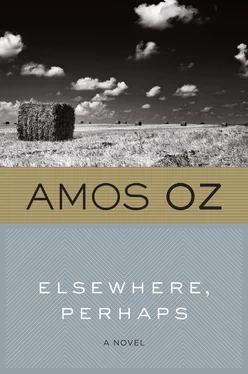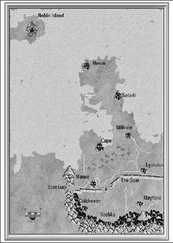So they sat, talking to the fishermen, for half an hour or so.
Grisha Isarov, who was himself a fisherman, won his hearers' hearts in the first five minutes. There was already a wager on between him and Babadjani, the stake being a bottle of arak; the subject of the bet only a fellow fisherman could understand.
Gershon Saragosti was overcome by Einav's beauty. He put his feelings into words. Einav blushed, smiled, and hastily smothered her smile. Tomer bristled and muttered to the fisherman, Shut up or… Siegfried woke up to the situation, and interposed a string of lively definitions of female beauty. There was a general round of laughter. Siegfried boasted that, just as some men were wine tasters, he was a professional woman taster. Again everyone laughed, except for Bronka, who had dropped off to sleep. Einav thumped the table with her little hand and shouted, Disgusting! You're all disgusting! But Tomer found himself among the laughers. There are two kinds of women, Ezra began. Zechariah interrupted him: There are three kinds — the two you were thinking of and… Siegfried named the third kind. There were helpless guffaws. Einav blushed again, and remarked sadly:
"That wasn't a nice joke."
Ezra chuckled.
"I've got another one. A nice one."
He told it. Needless to say, the fishermen all refused to be outdone. Grisha too. Even Tomer stuck his neck out and tersely told a story about a woman and an express train. Ezra was merry. We have not seen him merry before. Even in his merriment there was nothing rowdy or ill-mannered. Ezra may be only a simple truck driver, but he knows one thing his brother will never learn: how to keep things within bounds. Eventually Grisha began to tell an amazing story from the war. We shall keep our promise to him and reproduce it here verbatim, apart from one or two understandable omissions:
"Once I had in my possession a gold-plated dagger, inscribed in Gothic letters with the name "Ludendorff," and underneath, in square capitals, FROM ADOLF HITLER, WITH SALUTATIONS, TO MARSHAL GRAZIANI. You see this hand? All of you? Touch it. This very hand held that dagger. A historic dagger. I imagine that Ludendorff used it as a paper knife and that in the days of the Nazis they took it out of the museum and gave it to Hitler, and Hitler presented it to the Italian Fascist Marshal Graziani. There are two fantastic stories about that dagger. One: how it fell into my hands. Two: how it was taken out of my hands.
"After the defeat of Italy I lost my unit. I simply went off on a short after-duty,* and when I got back they'd moved on without me. To tell you the truth, I wasn't sorry. Those were great days in Rome, and I wanted to stay there. How did I live? Partly with the British, partly with the Americans, mostly with the Italian girls. Oh, those Italian girls! Once I went for a walk with one of them outside the city. We came to a magnificent villa, which was guarded by American soldiers. I was in Palestinian uniform. I was a staff sergeant. Now I'm a captain. That is, I was a captain. In our army. But nowadays we haven't got an army, only a lot of chocolate-cream soldiers. So I don't use my rank any more. All right. So, we see this guarded villa. I joke a bit with the sentries. Of course they're drunk to a man. I tell them I work for the secret department of the British Intelligence* and that I'm on a special mission. They inform me that the stores for two divisions are housed there. I point to the badge on my arm and say I'm in the Jewish Corps of the Top Secret Service, searching for all kinds of war criminals * They tell me that this was Graziani's villa. They're tight as ticks, and pretty impressed, but they still won't let me past without papers. So I pull out my union card and show it to them. It's all written in Hebrew. They call their officer over. Now, if they were drunk, their black officer is pissed out of his mind. He's almost crawling along on all fours, in his pajama trousers. Believe it or not, he's taken in by the card. He fingers it, sniffs at Ben Gurion's signature, takes a good look at the doll who's with me, and says, I salute you. He even has a go at saluting.
"Well, in we go, me and this girl, and we walk around the gardens for a while. We see some prisoners looking after the fantastic flowers, and I shout at them to pull their socks up, and they're not too impressed, but they smile like good little kids; si signore, si signore. Then we inspect the house for war criminals.* What a house! Words can't describe it. We find Graziani's bedroom. All done up in blue. Like a dream. We lock the door and commit a little war crime. * And there, in the bedroom, I suddenly spot this golden dagger lying on the dressing table, minding its own business. I pick it up, look at it, take it over to the light, turn it over. I see LUDENDORFF, HITLER, GRAZIANI. Grisha, I say to myself, Grisha, you're taking this with you to show your grandchildren what sort of a man their grandpa was. So I took it.
"Now I'll tell you an even more fantastic story. How I lost it.
"I lost the dagger in Rumania in '47, when I was sent there for the illegal immigration. I mean, as you can guess for yourselves, I didn't lose it. It was stolen. And how was it stolen? You'd never guess. It was a work of art. I was supposed to meet a member of the Communist government in Bucharest. Yes. I was the chief representative of the Hagganah in Eastern Europe. That is, one of the chief representatives. Well, I was invited to the house of this minister. We talked about this and that. It turned out he'd been a member of the anti-Nazi underground. Anyway, that's what he told me. We became friends. I spent about four hours in his apartment. I told him about the Jewish struggle. I thought to myself, You've made a good friend here. He told the dirtiest jokes of any man I've met. Anyway, for some reason I pulled the dagger out of my briefcase. (I used to take it with me everywhere. I was young in those days.) I showed it to him. He was amazed. He said he just had to show it to his wife; she was also an anti-Nazi, partisan and all that. All right, I say, why not? Please do. I hand it over to him. He goes into the next room. After a few minutes he comes back. Hands me the dagger. I put it away in my pocket. When I get back to my hotel, I look at it, and what do I see? It's not the same dagger. The so-and-so must have swapped them while he was out of the room. What could I do? Kick up a rumpus? Out of the question. Don't forget we had interests to look after. Incidentally, I've still got the Rumanian's dagger. I'll show it to you some time to prove that Grisha tells the truth. But what's it worth? Pennies. If I show it to my grandchildren, they'll say, What a fool grandpa was even when he was young. It's not for nothing there are all those jokes about Rumanians being thieves."
They exchanged stories about thieves and thefts. Ezra told the joke about "find" and "found." Then he told the one about Solomon's bed and the sixty valiant men. Everyone laughed.
Close to three o'clock in the morning they woke Bronka, called a taxi, and went home. It was a riotous journey. Everyone, Ezra, Zechariah, Tomer, Grisha, the pot-bellied driver, joked noisily. Only Bronka and Einav could not keep awake. They dozed on each other's shoulders.
Zechariah eyed his brother, and said to himself:
Good. Very good.
29. HERBERT SEGAL FIGHTS BACK
The summer broke up.
Three weeks before the New Year there were five successive days of false autumn. The temperature dropped sharply, the sky was overcast, the treetops rustled in the breeze. Five gentle days. On the fifth day Fruma Rominov died. She died at seven o'clock in the morning. She had gone out to look for the sanitary officer. She wanted to tell him that a certain kind of worm had appeared on the pine trees that could cause inflammations of the skin and eyes in young children. The trees must be sprayed with an insecticide that would kill off the worm but not harm the children.
Читать дальше












